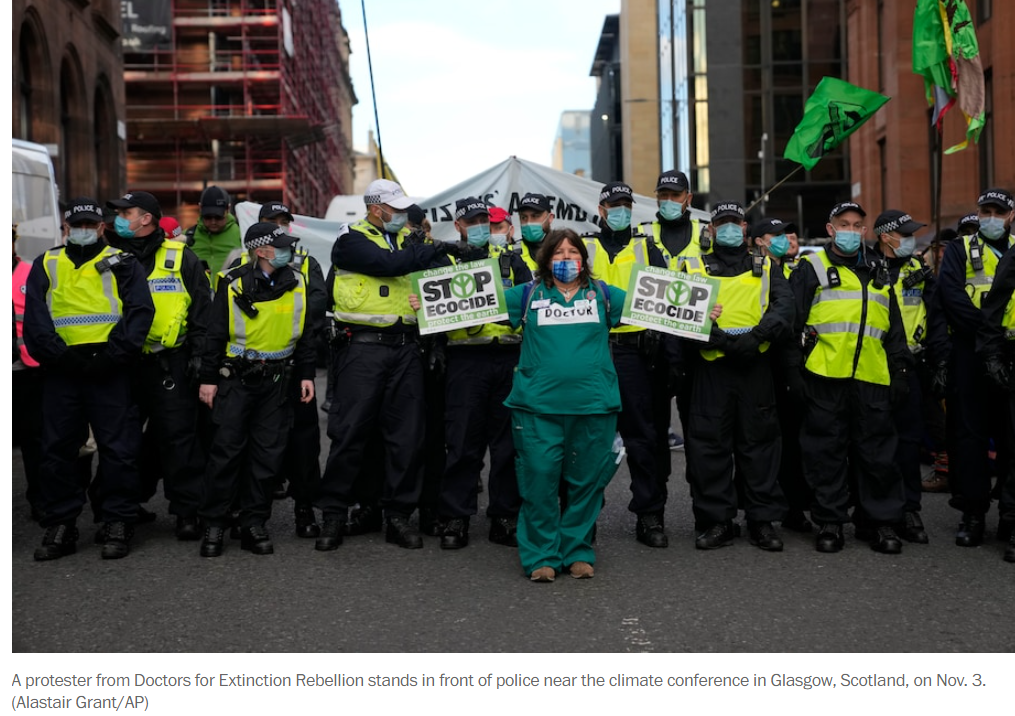As the dust settles on the COP26 climate change conference in Glasgow, Scotland, health professionals are finally feeling acknowledged by the global climate community.
More than 100 doctors and nurses traveled to Glasgow earlier this month with a message for world leaders: Global warming is a leading threat to public health. And curbing planet-warming emissions is a prescription.
That message resonated at COP26 more than it has at previous United Nations climate summits, according to experts who have been attending the talks for years.
“I have been coming to these for the last 12 years, and I have seen how certain topics have gained more relevance. And certainly public health is one of them,” Ramon Cruz, president of the Sierra Club‘s board of directors, told The Climate 202.
Jeni Miller, executive director of the Global Climate and Health Alliance, who has gone to five U.N. climate summits, agreed with that assessment. She noted that the World Health Organization sponsored a health pavilion at COP26 for the first time in the organization’s history.
“The WHO pavilion sounds like maybe a small thing,” Miller told The Climate 202. “But it made health — in a very literal sense of the term — visible at the COP. It created a physical place that people could walk by and countries’ delegations could see.”
Even before the conference in Glasgow, there was a growing recognition in the medical profession that rising global temperatures imperil millions of lives.
- The Lancet, a top medical journal, warned in October that climate change is set to become the “defining narrative of human health,” as my colleague Sarah Kaplan reported at the time.
- In a special report, the WHO also called climate change “the single biggest health threat facing humanity,” noting that its effects could be more catastrophic than the coronavirus pandemic.
Miller said health professionals urged world leaders in Glasgow to meet the more ambitious goal of the 2015 Paris agreement: limiting global warming to 1.5 degrees Celsius. “The science is clear that warming greater than that could be catastrophic for people’s health, and that every tenth of a degree averted matters,” she said.
Miller also noted that burning fossil fuels — a primary driver of climate change — releases air pollutants that can trigger asthma and other respiratory conditions. Fine-particle pollution from burning fossil fuels causes roughly 4 million people to die prematurely each year, research shows.
“Fossil fuels are killing us,” Miller said, adding that the science supports setting “clear targets for phasing out coal, the worst offender.”
In addition to the link between fine-particle pollution and respiratory conditions, climate change has menaced human health in the U.S. and globally in a variety of ways:
- Smoke from wildfires in California over the summer infiltrated the lungs and then the bloodstreams of people as far away as New York, Ohio and Texas.
- Rising temperatures have led to higher rates of heat illness, causing people to collapse in their homes when a heat dome roasted the Pacific Northwest in June.
- In Madagascar, extreme drought has caused crops to fail, leaving tens of thousands of people suffering from severe hunger and food insecurity, leading the U.N. to warn of the world’s first climate change-induced famine.
The good news is that doctors increasingly are keeping climate effects in mind when treating patients, said Renee Salas, an emergency medicine physician at Massachusetts General Hospital who attended COP26.
“If you come in with an asthma attack to my emergency department, that’s your primary diagnosis. But yet … climate change is driving pollen levels to be higher, so it is actually a secondary diagnosis,” Salas said during a panel last week hosted by Harvard University’s T.H. Chan School of Public Health.
Salas concluded her remarks with a call to action: Doctors and nurses must have an even greater impact on the next round of U.N. climate talks, known as COP27, which will be hosted by Egypt in 2022.
“We need to make sure that health has an even more prominent stage at COP27,” she said, “and that it’s actually incorporated throughout discussions.”
Article Credit: washingtonpost
